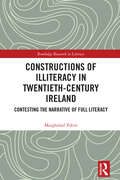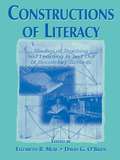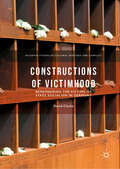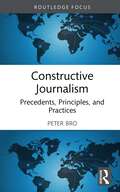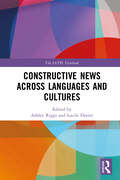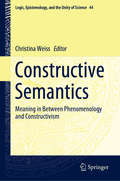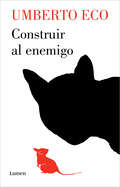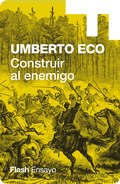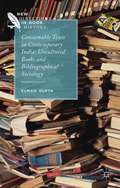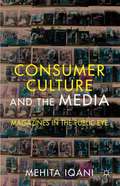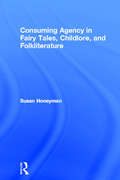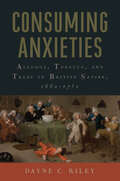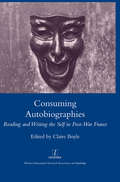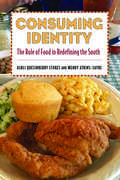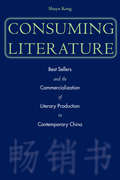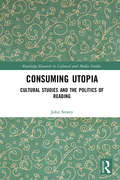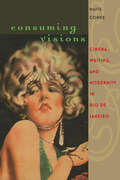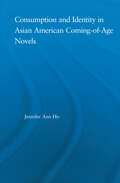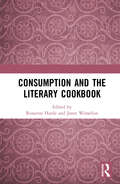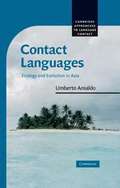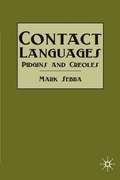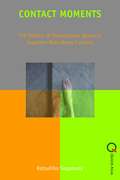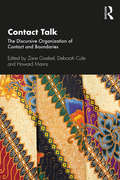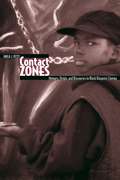- Table View
- List View
Constructions of Illiteracy in Twentieth-Century Ireland: Contesting the Narrative of Full Literacy (Routledge Research in Literacy)
by Maighréad TobinConstructions of Illiteracy in Twentieth Century Ireland: Contesting the Narrative of Full Literacy offers new insights into literacy and illiteracy in the context of twentieth-century Ireland. Through a close analysis of archived documentation from educational, military, and parliamentary sources, the book reveals a potent narrative of full literacy that promoted literacy proficiency as a facet of the Irish national identity and suppressed any formal acknowledgment of illiteracy within the adult population. Tobin applies a sociological approach and uses Foucauldian concepts of knowledge, power, discourse, and silence to examine how constructions of illiteracy and the “illiterate person” varied over time, while being consistently bound to nationalism and nation-building in the twentieth century. Though focused on Irish society from 1900-1980, this volume also offers a resonant lens through which to examine the aims of the “Decade of Centenaries,” an Irish Government initiative spanning 2012-2023 that commemorates significant events in the history of the Irish state. Relevant to any readers with an interest in the Irish experience of independence, decolonisation, and postcolonialism, this book will be a useful companion for scholars and postgraduate students of literacy and Irish studies more broadly.
Constructions of Literacy: Studies of Teaching and Learning in and Out of Secondary Classrooms
by Elizabeth B. Moje David G. O’BrienConstructions of Literacy explores and represents, through a series of cases and commentaries, how and why secondary school teachers and students use literacy in formal and informal learning settings. As used in the context of this book, secondary literacy refers to speaking, listening, reading, writing, and performing. It also refers to how these processes or events are constructed, negotiated, and used for specific purposes by teachers and students as they engage in various classroom, school, and community practices and interactions. The authors operate from a stance that literacy is socially, culturally, and historically constructed. They recognize that there are many different perspectives on how that construction occurs--some arguing for institutional and structural influences--others suggesting that people have some degree of agency within the constraints imposed by larger structures. A distinguishing feature of the volume is that the contributors explore and make explicit differing perspectives on literacy as a social construction. The volume is built around case studies of secondary school teachers' and students' literacy practices inside and outside of schools. The cases include diverse (critical, cultural, feminist, interpretive, phenomenological, and postmodern) theoretical and epistemological perspectives and research methodologies, making this one of the first collections of studies in secondary content area classrooms conducted from multiple perspectives. It concludes with two Commentaries, one by Donna Alvermann and one by David Bloome, in which they discuss and critique the contributions made from the different perspectives and grapple with how they simultaneously illuminate and confuse issues in literacy theory, research, and practice. Preservice and in-service teachers, school professionals, and researchers in literacy education, secondary education, and curriculum theory will find this book stimulating and informative. It will help them analyze the complexities of secondary literacy teaching and learning, and examine their own understandings of literacy within their own literacy contexts.
Constructions of Masculinity in British Literature from the Middle Ages to the Present
by Stefan HorlacherAn in-depth analysis into the construction of male identity as well as a unique and comprehensive historical overview of how masculinity has been constructed in British literature from the Middle Ages to the present. This book is an important contribution to the emerging field of masculinity studies.
Constructions of Victimhood: Remembering the Victims of State Socialism in Germany (Palgrave Studies in Cultural Heritage and Conflict)
by David ClarkeThe post-war Federal Republic of Germany faced the task of addressing the plight of the victims of state socialism under the Soviet occupation of eastern Germany and in the German Democratic Republic, many of whom fled to the west. These victims were not passive objects of the West German state’s policy, but organized themselves into associations that fought for recognition of their contribution to the fight against communism. After German unification, the task of commemorating and compensating these victims continued under entirely new political circumstances, yet also in the context of global trends in memory politics and transitional justice that give priority to addressing the fate of victims of non-democratic regimes. Constructions of Victimhood: Remembering the Victims of State Socialism in Germany draws on the constructivist systems theory of Niklas Luhmann to analyze the role of victims organizations, the political system, and historians and heritage professionals in the struggle over the memory of suffering under state socialism, from the Cold War to the present day. The book argues that the identity and social role of victims has undergone a process of constant renegotiation in this period, offering an innovative theoretical framework for understanding how restorative measures are formulated to address the situation of victims. As such, it offers not only insights into a neglected aspect of post-war German history, but also contributes to the ongoing academic debate about the role of victims in process of transitional justice and the politics of memory.
Constructive Journalism: Precedents, Principles, and Practices (Routledge Focus on Journalism Studies)
by Peter BroThis book offers a deep and comprehensive overview of constructive journalism, setting out the guiding principles and practices for a journalism that aims to do more than simply inform about problems. In this authoritative yet concise volume, Peter Bro asks what does constructive journalism mean, what are the underlying principles, how is it practiced, and in what ways does it differ from other types of journalism? Drawing on studies of the rapidly growing number of works by both journalism practitioners and researchers, the book reaches beyond these questions to show how the notion of being constructive has been a part of journalism from the very beginning of the profession. This introduction to what constructive journalism is and was and what it can accomplish will guide new journalists; journalism, media, and mass communication students; and scholars working on journalistic theory and practice.
Constructive News Across Languages and Cultures (The IATIS Yearbook)
by Lucile Davier Ashley RiggsConstructive news is an alternative to the negativity of if-it-bleeds-it-leads journalism but still unfamiliar to some audiences and still relatively under-researched, particularly by news translation scholars. And yet, it is “done” across cultures and, therefore, languages. This innovative book contributes to filling that research gap and raising awareness of the phenomenon by showcasing cross-cultural research on constructive news, including in the Global South – a region that has traditionally received less scholarly attention than the Global North. Constructive news is resolutely multimodal, and so a number of chapters analyse it from that perspective. The chapters also tackle such topics as audience attitudes, service to the local community, pedagogy, financial news, and religious news. This book will appeal to journalism studies and translation scholars, applied linguists, lecturers, journalists, editors, and members of the public who consume, study, or teach news but are looking for alternatives.
Constructive Semantics: Meaning in Between Phenomenology and Constructivism (Logic, Epistemology, and the Unity of Science #44)
by Christina WeissThis edited book brings together research work in the field of constructive semantics with scholarship on the phenomenological foundations of logic and mathematics. It addresses one of the central issues in the epistemology and philosophy of mathematics, namely the relationship between phenomenological meaning constitution and constructive semantics. Contributing authors explore deep structural connections and fundamental differences between phenomenology and constructivism. Papers are drawn from contributions to a prestigious workshop held at the University of Friedrichshafen. Readers will discover insight into structural connections between the phenomenological concept of meaning constitution and constructivist concepts of meaning. Discussion ranges from more specific conceptualizations in the philosophy of logic and mathematics to more general considerations in epistemology, inferential semantics and phenomenology. Questions such as a possible phenomenological understanding of the relationship between structural rules and particle rules in dialogical logic are explored. Significant aspects of both phenomenology and dialectics, and dialectics and constructivism emerge. Graduates and researchers of philosophy, especially logic, as well as scholars of mathematics will all find something of interest in the expert insights presented in this volume.
Construir al enemigo
by Umberto EcoPiezas que nacieron de un encargo o del puro divertimento donde Umberto Eco habla de los temas más variados, paseando con desenvoltura desde la literatura a la política o la astronomía, y donde cada escrito se convierte en una pequeña lección para el que lo lee. El libro arranca con el texto titulado «Construir al enemigo», donde se insiste en las bondades de tener siempre a mano a un rival en quien descargar nuestras debilidades o faltas y, si ese rival no existe, pues habrá que crearlo. Le siguen otros textos que cabalgan de Dan Brown a Barak Obama y Angela Merkel, y una espléndida pieza que aborda el tema de Wikileaks, invitándonos a reflexionar sobre el poder del silencio en una sociedad donde el escándalo es moneda corriente. En otros escritos sale a la luz la corrupción política italiana, aliñada con el cuerpo de mujeres hermosas y dispuestas a triunfar, pero alrededor de este tema tan manido el professore hila unsagaz discurso sobre el ruido mediático, especialmente creado desde los centros de poder para distraer al ciudadano medio y ocultar otras noticias importantes. Y de la política pasamos al Ulises, de Joyce, para descubrir una nueva opinión sobre esta novela que muchos mientan y pocos han leído. Resumiendo, Eco tiene edad y condición para hablar de casi todo, enlazando temas que en apariencia parecen muy lejanos, y Construir al enemigo es el mejor ejemplo de una inteligencia privilegiada puesta al servicio de esos lectores que a la vida le piden algo más que titulares de periódico.
Construir al enemigo (Colección Endebate #Volumen)
by Umberto EcoUmberto Eco reflexiona con maestría sobre la importancia de tener un enemigo. Todo el mundo necesita tener un enemigo, nos dice Umberto Eco, los países, los sistemas, cada uno de nosotros... Y si no existe el enemigo, hay que inventarlo, es una figura imprescindible, un antagonista que nos permite definir nuestra identidad y medir nuestro sistema de valores. Este ensayo extraordinario, cuya idea desarrollará después en su novela El cementerio de Praga, apareció en el volumen homónimo que recoge trece «textos de ocasión» según el propio Eco, publicado en Lumen el año 2012.
Consumable Texts in Contemporary India
by Suman GuptaThrough what he terms "bibliographical sociology," Suman Gupta explores the presence of English-language publications in the contemporary Indian context their productions, circulations and readerships to understand current social trends. "
Consumer Culture and the Media
by Mehita IqaniHow did consumer culture become synonymous with westernised societies? Iqani argues that it is the way it is promoted by media texts. She provides a detailed analysis of publicly displayed consumer magazine covers and engages with big questions about the public, power and identity in mediated consumer culture.
Consuming Agency in Fairy Tales, Childlore, and Folkliterature (Routledge Studies in Folklore and Fairy Tales #2)
by Susan HoneymanIn this book Honeyman looks at manifestations of youth agency (and representations of agency produced for youth) as depicted in fairy tales, childlore and folk literature, investigating the dynamic of ideological manipulation and independent resistance as it can be read or expressed in bodies, first through social puppetry and then through coercive temptation (our consumption replacing the more obvious strings that bind us). Reading tales like Popeye, Hansel & Gretel, and Pinocchio, Honeyman concentrates on the agency of young subjects through material relations, especially where food signifies the invisible strings used to control them in popular discourse and practice, modeling efforts to come out from under the hegemonic handler and take control, at least of their own body spaces, and ultimately finding that most examples indicate less power than the ideal holds.
Consuming Anxieties: Alcohol, Tobacco, and Trade in British Satire, 1660-1751 (Transits: Literature, Thought & Culture, 1650-1850)
by Dayne C. RileyWriters of the late seventeenth and early eighteenth centuries—a period of vast economic change—recognized that the global trade in alcohol and tobacco promised a brighter financial future for England, even as overindulgence at home posed serious moral pitfalls. This engaging and original study explores how literary satirists represented these consumables—and related anxieties about the changing nature of Britishness—in their work. Riley traces the satirical treatment of wine, beer, ale, gin, pipe tobacco, and snuff from the beginning of Charles II’s reign, through the boom in tobacco’s popularity, to the end of the Gin Craze in libertine poems and plays, anonymous verse, ballad operas, and the satire of canonical writers such as Gay, Pope, and Swift. Focusing on social concerns about class, race, and gender, Consuming Anxieties examines how satirists championed Britain’s economic strength on the world stage while critiquing the effects of consumable luxuries on the British body and consciousness.
Consuming Autobiographies: Reading and Writing the Self in Post-war France
by Claire Boyle"Since 1975, French literary writing has been marked by an autobiographical turn which has seen authors increasingly often tap into the vein of what the French term ecriture de soi. This coincides, paradoxically, with the 'death of autobiography', as these authors self-consciously distance themselves and their writings from conventional autobiography, founding a 'nouvelle autobiographie' where the very possibility of autobiographical expression is questioned. In the first book-length study in English to address this phenomenon, Claire Boyle sheds a new light on this hostility toward autobiography through a series of ground-breaking studies of estrangement in autobiographical works by major post-war authors Nathalie Sarraute, Georges Perec, Jean Genet and Helene Cixous. She identifies autobiography as a site of conflict between writer and reader, as authors struggle to assert the unknowableness of their identity in the face of a readership resolutely desiring privileged knowledge. Autobiography emerges as a deeply troubling genre for authors, with the reader as an antagonistic consumer of the autobiographical self."
Consuming Identity: The Role of Food in Redefining the South (Race, Rhetoric, and Media Series)
by Ashli Quesinberry Stokes Wendy Atkins-SayreSoutherners love to talk food, quickly revealing likes and dislikes, regional preferences, and their own delicious stories. Because the topic often crosses lines of race, class, gender, and region, food supplies a common fuel to launch discussion. Consuming Identity sifts through the self-definitions, allegiances, and bonds made possible and strengthened through the theme of southern foodways. The book focuses on the role food plays in building identities, accounting for the messages food sends about who we are, how we see ourselves, and how we see others. While many volumes examine southern food, this one is the first to focus on food’s rhetorical qualities and the effect that it can have on culture.The volume examines southern food stories that speak to the identity of the region, explain how food helps to build identities, and explore how it enables cultural exchange. Food acts rhetorically, with what we choose to eat and serve sending distinct messages. It also serves a vital identity-building function, factoring heavily into our memories, narratives, and understanding of who we are. Finally, because food and the tales surrounding it are so important to southerners, the rhetoric of food offers a significant and meaningful way to open up dialogue in the region. By sharing and celebrating both foodways and the food itself, southerners are able to revel in shared histories and traditions. In this way individuals find a common language despite the divisions of race and class that continue to plague the South. The rich subject of southern fare serves up a significant starting point for understanding the powerful rhetorical potential of all food.
Consuming Literature: Best Sellers and the Commercialization of Literary Production in Contemporary China
by Shuyu KongThis book examines the changes taking place in literary writing and publishing in contemporary China under the influence of the emerging market economy. It focuses on the revival of literary best sellers in the Chinese book market and the establishment of a best-seller production machine. The author examines how writers have become cultural entrepreneurs, how state publishing houses are now motivated by commercial incentives, and how "second-channel," unofficial publishers and distributors both compete and cooperate with official publishing houses in a dual-track, socialist-capitalist economic system. Taken together, these changes demonstrate how economic development and culture interact in a postsocialist society, in contrast to the way they work in the mature capitalist economies of the West. That economic reforms have affected many aspects of Chinese society is well known, but this is the first comprehensive analysis of market influences in the literary field. This book thus offers a fresh perspective on the inner workings of contemporary Chinese society.
Consuming Utopia: Cultural Studies and the Politics of Reading (Routledge Research in Cultural and Media Studies)
by John StoreyConsuming Utopia builds on critical insights into consumption and utopianism developed in two previous books by the author to elaborate what it means to read utopian fiction (including dystopian and anti-utopian) from the critical perspective of cultural studies. With a critical focus on social practices of reading rather than on the text itself, John Storey advances a timely and relevant contribution to existing debates on utopian fiction, offering new insights into how we might understand the politics of utopian fiction. Finding readership and readers indispensable to the act of producing politics beyond the text, Storey argues that if utopian fiction has a ‘politics’, it is determined by those who, in actuality, pick up books and act on what they read, rather than readers proposed by textuality. By engaging with seminal concepts in cultural studies, this book shows how reading utopian fiction works to make the meaning of such texts material and social, and therefore available for politics. An essential addition to the literature on utopian fiction, this book will be of great interest to scholars and students in the areas of cultural studies, literary studies, comparative literature, cultural politics, utopian studies, and political theory.
Consuming Visions: Cinema, Writing, and Modernity in Rio de Janeiro (New World Studies)
by Maite CondeConsuming Visions explores the relationship between cinema and writing in early twentieth-century Brazil, focusing on how the new and foreign medium of film was consumed by a literary society in the throes of modernization. Maite Conde places this relationship in the specific context of turn-of-the-century Rio de Janeiro, which underwent a radical transformation to a modern global city, becoming a concrete symbol of the country's broader processes of change and modernization. Analyzing an array of literary texts, from journalistic essays and popular women's novels to anarchist treatises and vaudeville plays, the author shows how the writers' encounters with the cinema were consistent with the significant changes taking place in the city.The arrival and initial development of the cinema in Brazil were part of the new urban landscape in which early Brazilian movies not only articulated the processes of the city's modernization but also enabled new urban spectators—women, immigrants, a new working class, and a recently liberated slave population—to see, believe in, and participate in its future. In the process, these early movies challenged the power of the written word and of Brazilian writers, threatening the hegemonic function of writing that had traditionally forged the contours of the nation's cultural life. An emerging market of consumers of the new cultural phenomena—popular theater, the department store, the factory, illustrated magazines—reflected changes that not only modernized literary production but also altered the very life and everyday urban experiences of the population. Consuming Visions is an ambitious and engaging examination of the ways in which mass culture can become an agent of intellectual and aesthetic transformation.
Consumption and Identity in Asian American Coming-of-Age Novels (Studies in Asian Americans)
by Jennifer HoThis interdisciplinary study examines the theme of consumption in Asian American literature, connection representations of cooking and eating with ethnic identity formation. Using four discrete modes of identification--historic pride, consumerism, mourning, and fusion--Jennifer Ho examines how Asian American adolescents challenge and revise their cultural legacies and experiment with alternative ethnic affiliations through their relationships to food.
Consumption and the Literary Cookbook
by Roxanne Harde and Janet WesseliusConsumption and the Literary Cookbook offers readers the first book-length study of literary cookbooks. Imagining the genre more broadly to include narratives laden with recipes, cookbooks based on cultural productions including films, plays, and television series, and cookbooks that reflected and/or shaped cultural and historical narratives, the contributors draw on the tools of literary and cultural studies to closely read a diverse corpus of cookbooks. By focusing on themes of consumption—gastronomical and rhetorical—the sixteen chapters utilize the recipes and the narratives surrounding them as lenses to study identity, society, history, and culture. The chapters in this book reflect the current popularity of foodie culture as they offer entertaining analyses of cookbooks, the stories they tell, and the stories told about them.
Contact Languages
by Umberto AnsaldoWhy do groups of speakers in certain times and places come up with new varieties of languages? What are the social settings that determine whether a mixed language, a pidgin or a Creole will develop, and how can we understand the ways in which different languages contribute to the new grammar? Through the study of Malay contact varieties such as Baba Malay, Cocos Malay and Sri Lanka Malay, as well as the Asian Portuguese vernacular of Macau, and China Coast Pidgin, the book explores the social and structural dynamics that underlie the fascinating phenomenon of the creation of new, or restructured, grammars. It emphasizes the importance and interplay of historical documentation, socio-cultural observation and linguistic analysis in the study of contact languages, offering an evolutionary framework for the study of contact language formation - including pidgins and Creoles - in which historical, socio-cultural and typological observations come together.
Contact Languages: Pidgins and Creoles
by Mark SebbaIn the last three decades, the field of pidgin and creole studies has become recognized as central to modern linguistics. Designed for the student without previous knowledge of the field, this book builds chapter by chapter to give a compregensive overview of current thinking and research on pidgins and creoles.
Contact Moments: The Politics of Intercultural Desire in Japanese Male-Queer Cultures
by Katsuhiko SuganumaThis book sheds light on 'contact moments' between Japanese male-queer culture and that of the West in the postwar period, and critiques various contemporary examples of persistent Orientalism and nativism. Focusing on a range of Japanese as well as English male-queer materials including magazines, memoirs and cybertexts, Suganuma shows how the interactions of the two cultures affected the subject formation process of queer selves. The instances examined range from the hentai magazines of the 1950s and their depiction of men who had sex with foreign men (mostly American servicemen); the depiction of race in the magazine Barazoku; John Whittier Treat's memoir of his sabbatical in Japan and his depiction of his own Orientalism; the writings and strategies of OCCUR and Fushimi in the 1990s; and the GJN news site. The author sees the depiction of and reaction to Japanese men who had sex with foreigners in the hentai magazines as part of a larger pattern of representation manifesting gender anxieties among Japanese men (both heterosexual and homosexual) who found themselves feminized by defeat in the war. He draws on Dyer's understanding of whiteness as a flexible default position in his discussion of Barazoku, but argues that in this case Japaneseness is the default position and whiteness is othered. In his final chapter, he argues for an understanding of the activities of GJN also as a space of mediation rather than simply as a wholesale importation of American or 'global gay' culture. Suganuma argues that the binaries of cross-cultural comparison (local/global, Japan/West, acts/identities, and us/them) can be generative and productive as well as repressive and reductive.
Contact Talk: The Discursive Organization of Contact and Boundaries
by Zane Goebel Howard Manns Deborah ColeWritten by a wide range of highly regarded scholars and exciting junior ones, this book critiques and operationalizes contemporary thinking in the rapidly expanding field of linguistic anthropology. It does so using case studies of actual everyday language practices from an extremely understudied yet incredibly important area of the Global South: Indonesia. In doing so, it provides a rich set of studies that model and explain complex linguistic anthropological analysis in engaging and easily understood ways. As a book that is both accessible for undergraduate students and enlightening for graduate students through to senior professors, this book problematizes a wide range of assumptions. The diversity of settings and methodologies used in this book surpass many recent collections that attempt to address issues surrounding contemporary processes of diversification given rapid ongoing social change. In focusing on the trees, so to speak, the collection as a whole also enables readers to see the forest. This approach provides a rare insight into relationships between everyday language practices, social change, and the ever-present and ongoing processes of nation-building.
Contact Zones: Memory, Origin, and Discourses in Black Diasporic Cinema
by Sheila J. PettyCreated at the crossroads of slavery, migration, and exile, and comprising a global population, the black diaspora is a diverse space of varied histories, experiences, and goals. Likewise, black diasporic film tends to focus on the complexities of transnational identity, which oscillates between similarity and difference and resists easy categorization. In Contact Zones author Sheila J. Petty addresses a range of filmmakers, theorists, and issues in black diasporic cinema, highlighting their ongoing influences on contemporary artistic and theoretical discourses. Petty examines both Anglophone and Francophone films and theorists, divided according to this volume's three thematic sections--Slavery, Migration and Exile, and Beyond Borders. The feature films and documentaries considered--which include Sankofa, Daughters of the Dust, The Man by the Shore, and Rude, among others--represent a wide range of cultures and topics. Through close textual analysis that incorporates the work of well-known diasporic thinkers like W. E. B. DuBois, Aimé Césaire, and Frantz Fanon along with contemporary notables such as Molefi Kete Asante, bell hooks, Clenora Hudson-Weems, René Depestre, Paul Gilroy, and Rinaldo Walcott, Petty details the unique ways in which black diasporic films create meaning. By exploring a variety of African American, Caribbean, Black British, and African Canadian perspectives, Contact Zones provides a detailed survey of the diversity and vitality of black diasporic contributions to cinema and theory. This volume will be a welcome addition to the libraries of scholars and students of film studies and Africana studies.
